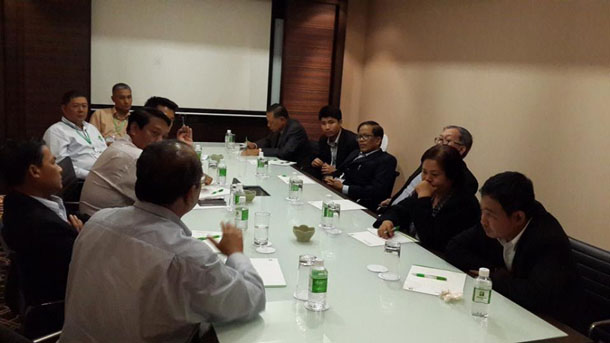RANGOON — Leaders of Burma’s ethnic groups said a nationwide ceasefire agreement was unlikely to be signed next month, after a meeting with a government-led negotiating team ended with disagreement this weekend.
The leaders of the United Nationalities Federal Council (UNFC), an alliance of 11 of Burma’s armed ethnic groups, met with negotiators led by President’s Office Minister Aung Min in the northern Thai city of Chiang Mai.
Nai Hong Sa, the general secretary of the UNFC, said ethnic leaders gave no immediate response to an invitation by the government-led negotiating team, which includes members of the Myanmar Peace Center, to sign an agreement in Burma next month.
The UNFC will respond to the invitation later, but a national deal will likely not be signed in October, as the government wishes, he said.
During the meeting, Aung Min listed a number of demands that drew disagreement from ethnic leaders, according to Nai Hong Sa, who said the minister told the UNFC member groups not to kill civilians, collect taxes, recruit new members, intervene in the government’s administration or initiate hostilities with government-backed ethnic militias.
Nai Hong Sa added that the Aung Min-led delegation claimed there would be no fighting if the ethnic armed groups refrained from attacking government-backed militias, giving the example of clashes in northern Burma.
The UNFC general secretary said an ethnic Shan participant insisted at the meeting, in reply to Aung Min, that the ethnic armed groups do not target civilians, unlike the government.
“We told them that we engage in armed struggle with the support of our people. We don’t conduct tax by force. Just like the government collects taxes from citizens, we also need to collect taxes from our people to survive,” said Nai Hong Sa.
“This is unavoidable as long as there are armed conflicts. If you don’t want us to [levy taxes], you better solve the conflict by political means.”
In a press conference in Chiang Mai on Sunday following the talks, Aung Min told the media that 14 of the 16 ethnic armed groups have signed individual ceasefire agreements with the government.
“After all the ethnic armed groups sign ceasefire agreements, we need to sign a nationwide ceasefire accord. We plan to organize the nationwide ceasefire accord in October,” said Aung Min.
The UNFC is also, along with other ethnic groups within Burma, planning within three months to propose a new Constitution to replace the 2008 document, which is not in line with their demands for a federalist system in Burma.
“We have prepared the drafts already, which is why we say we will finish drawing up [the new Constitution] in three months. We may take one more month in case it won’t be finished,” Col Khun Okkar, a leader of the effort to draft a federal Constitution, told The Irrawaddy.
“The new Constitution is going to be created using the suitable points we achieved from our 20-year-old policies.”
The United Nationalities Alliance, the United Nationalities League for Democracy and the National Council of the Union of Burma are all involved in drawing up a proposal for a new Constitution, along with ethnic and legal experts.
Aye Thar Aung, chairman of the Arakan League for Democracy, said Burma’s current Constitution was not accepted by the majority of the public
“Whether the government and the Parliament will accept [the new Constitution draft] or not is another issue. The 2008 Constitution is publicly slammed for being undemocratic and for its lack of rights to ethics minorities,” he said.
“If the present Constitution is incomplete, we need to prepare another Constitution that is complete.”
The Irrawaddy reporter Khin Oo Thar contributed to this report.

















